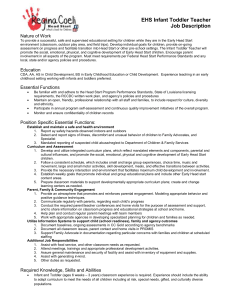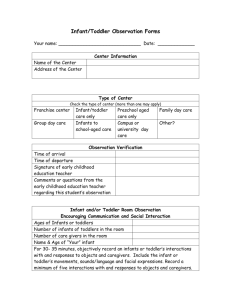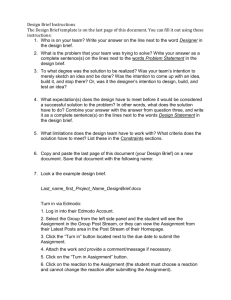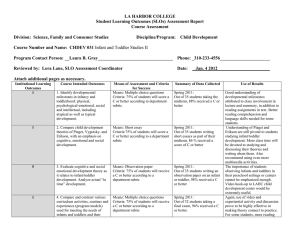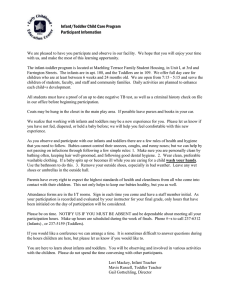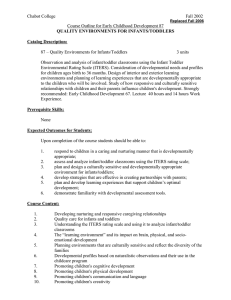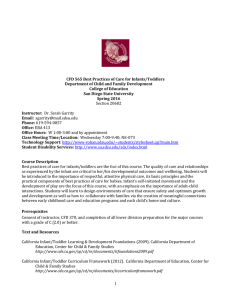CFD 565 Best Practices of Care for Infants/Toddlers College of Education
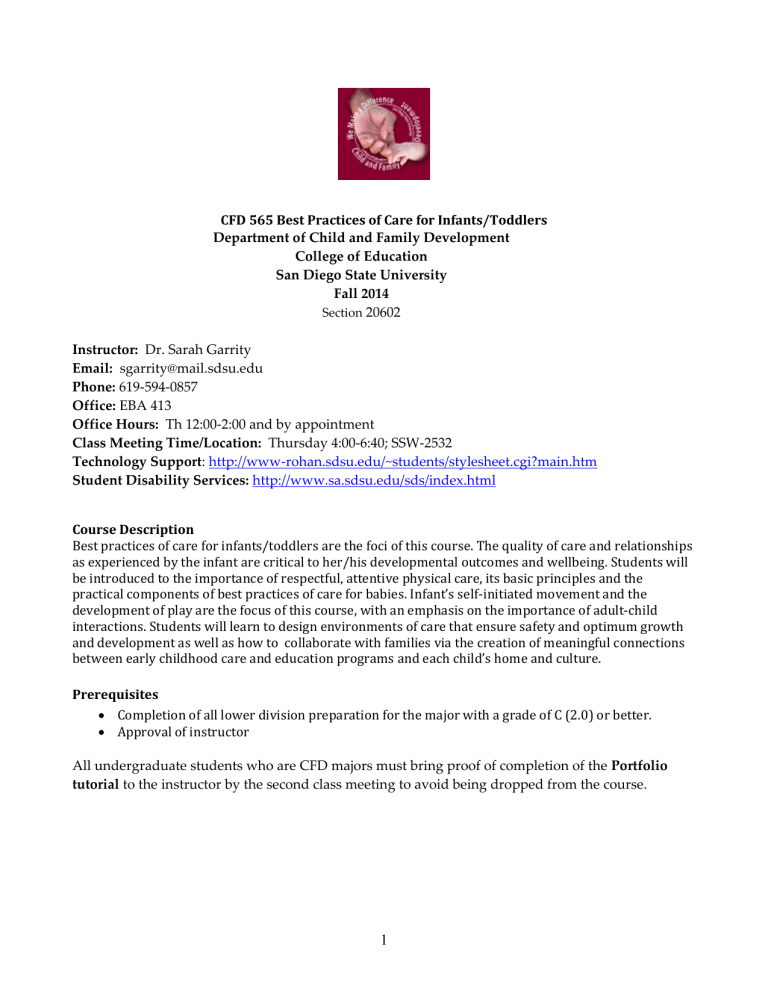
CFD 565 Best Practices of Care for Infants/Toddlers
Department of Child and Family Development
College of Education
Instructor: Dr. Sarah Garrity
Email: sgarrity@mail.sdsu.edu
Phone: 619-594-0857
San Diego State University
Fall 2014
Section 20602
Office: EBA 413
Office Hours: Th 12:00-2:00 and by appointment
Class Meeting Time/Location: Thursday 4:00-6:40; SSW-2532
Technology Support: http://www-rohan.sdsu.edu/~students/stylesheet.cgi?main.htm
Student Disability Services: http://www.sa.sdsu.edu/sds/index.html
Course Description
Best practices of care for infants/toddlers are the foci of this course. The quality of care and relationships as experienced by the infant are critical to her/his developmental outcomes and wellbeing. Students will be introduced to the importance of respectful, attentive physical care, its basic principles and the practical components of best practices of care for babies. Infant’s self-initiated movement and the development of play are the focus of this course, with an emphasis on the importance of adult-child interactions. Students will learn to design environments of care that ensure safety and optimum growth and development as well as how to collaborate with families via the creation of meaningful connections between early childhood care and education programs and each child’s home and culture.
Prerequisites
Completion of all lower division preparation for the major with a grade of C (2.0) or better.
Approval of instructor
All undergraduate students who are CFD majors must bring proof of completion of the Portfolio
tutorial to the instructor by the second class meeting to avoid being dropped from the course.
1
Learning Objectives
By the end of this course, students will:
1.
Review the principle theoretical perspective and research findings of best practices of care for
Infants/toddlers.
2.
Demonstrate knowledge of observing infant/toddler development focusing on gross motor development and its effects on cognitive and socio-emotional development.
3.
Make connections between theory, research and practice considering the implications of best practices of care for infants and toddlers research on educational practice, intervention decisions, guidance strategies and the development of public policy.
4.
Demonstrate the ability to conduct a systematic observation and analysis of infant/caregiver respectful interaction and care.
Text and Resources
California Infant/Toddler Learning & Development Foundations (2009). California Department of
Education, Center for Child & Family Studies http://www.cde.ca.gov/sp/cd/re/documents/itfoundations2009.pdf
California Infant/Toddler Curriculum Framework (2012). California Department of Education, Center for
Child & Family Studies http://www.cde.ca.gov/sp/cd/re/documents/itcurriculumframework.pdf
Gerber, M. Dear Parent: Caring for Infants With Respect (2nd Edition)(2003). (Resources for Infant
Educators (RIE); Expanded edition
Kovach, B. (2008). Being with Babies: Understanding and Responding to the Infants in Your Care (Best
Practices for Caregivers). Gryphon House
Lally, J. R., Mangione, P.L., Greenwald, D. (Eds.)(2006). Concepts for Care: 20 Essays on
Infant/Toddler Development and Learning. WestEd.
Ong, F. (Ed.)(2006). Infant/Toddler Learning & Development: Program Guidelines. California Department of Education http://www.cde.ca.gov/sp/cd/re/documents/itguidelines.pdf
Publication Manual of the American Psychological Association (6th ed.) (2009).
TaskStream
CFD Majors who are enrolled in this course will need to have a TaskStream electronic portfolio subscription, and be enrolled in the appropriate TaskStream "Program" which contains your program portfolio. More information about purchasing a TaskStream subscription and enrolling into a TaskStream Program is available in the “CFD Portfolio” section of the Child and Family
Development website: http://coe.sdsu.edu/cfd/portfolio/index.php
2
Sage Project
As part of this course, I have partnered with the Sage Project, which is a partnership between San
Diego State University (SDSU) and a local government in the San Diego region. Students, through their course work, engage in meaningful real-world projects and contribute to the quality of life of residents in a community in SDSU’s service area.
Students from across the University assist local governments with partner-directed projects that address their smart growth, quality of life, and sustainability goals.
SDSU students and faculty connect with high-priority, high-need community projects, thereby generating interest and fresh ideas that create momentum and provide real service to the community.
The Sage Project is based on the highly successful and award winning Sustainable City Year Program at the University of Oregon. Like the project in Oregon, the Sage Project at SDSU engages hundreds of students who invest thousands of hours assisting communities in our region as they seek to build a more equitable and sustainable future.
Students in CFD 565 will be assessing the quality of Early Head Start (EHS) classrooms and Family Child
Care (FCC) homes in National City and other areas in the South Bay using the Infant Toddler
Environmental Rating Scale (ITERS) or Family Childcare Rating Scale (FDCRS). You will be required to spend at least 3 hours observing in an EHS classroom or FCC home to complete this tool. You will work with a partner to ensure inter-reliability and results will be provided to the Early Head Start program.
The agency responsible for administering the EHS program in the southbay is Episcopal Community
Services. To learn more about them, please visit http://www.ecscalifornia.org/programs/head-start/ .
More information about this project and the assignment will be given in class and posted on Blackboard.
You can follow Sage on Twitter: SDSU SustainableCity @SustainableSDSU and Facebook: The Sage
Project .
I
Assignments
Assignment
Six (6) Observations** of infant/toddler in the child/home care setting: (10 points each x 6 = 60 points)
1. Three month old
2. Six-10 month old
3. Eleven-16 month old
4. Seventeen – 22 month old
5. Twenty-three-30 month old
6. Thirty-one –36 month old
For each one of the observations (1 hour long), please write an observation report (4-5 pages) linking the observed behaviors and interactions to the theories and evidence-based information as presented in your readings. Follow APA style.
Conduct an assessment of an infant/toddler
Student Learning Outcomes
Review the principle theoretical perspective and research findings of best practices of care for
Infants/toddlers. (Learning outcome 1)
Demonstrate knowledge of observing infant/toddler development focusing on gross motor development and its effects on cognitive and socio-emotional development. (Learning outcome 2)
Demonstrate the ability to conduct a systematic observation and analysis of infant/caregiver respectful interaction and care. (Learning outcome 4)
Make connections between theory, research and
3
classroom/FCC Home using ITERS/FDCERS. Write an assessment reports (4-5 pages each) integrating best practice recommendations. (15 points)
Write a proposal for an infant/toddler program following best practices. Your proposal needs to include evidence-based information to support your proposal. You need to use at least 6 additional references in addition to your class readings. (25 points) Graduate students will be required to have 12 additional references.
Assignment must be uploaded to TaskStream. practice considering the implications of best practices of care for infants and toddlers research on educational practice, intervention decisions, guidance strategies and the development of public policy.
(Learning outcome 3)
Demonstrate the ability to conduct a systematic observation and analysis of infant/caregiver respectful interaction and care. (Learning outcome 4)
Review the principle theoretical perspective and research findings of best practices of care for
Infants/toddlers. (Learning outcome 1)
Make connections between theory, research and practice considering the implications of best practices of care for infants and toddlers research on educational practice, intervention decisions, guidance strategies and the development of public policy.
(Learning outcome 3)
In Class Discussions and Activities about Assigned
Reading (10 points)
Review the principle theoretical perspective and research findings of best practices of care for
Infants/toddlers. (Learning outcome 1)
Demonstrate knowledge of observing infant/toddler development focusing on gross motor development and its effects on cognitive and socio-emotional development. (Learning outcome 2)
Make connections between theory, research and practice considering the implications of best practices of care for infants and toddlers research on educational practice, intervention decisions, guidance strategies and the development of public policy.
(Learning outcome 3)
** It is the responsibility of the student to identify infant/toddlers to observe for this assignment. I will be providing suggestions whenever possible, however, please be aware that this is your
responsibility.
Grading Scale
A
A-
B+
B
93-100 points
90-92 points
87-89 points
83-86 points
C+ 77-79 points
C 73-76 points
C- 70-72 points
D+ 67-69 points
D 60-66 points
F 59 points or below
B- 80-82 points
C OURSE P OLICIES
Professional Behavior
It is expected that students exhibit professional behavior inside the classroom, during fieldwork experiences, and working with other students outside of the class on assignments related to this class.
With regard to fieldwork experiences, students are expected to demonstrate behavior as specified in the
4
NAEYC Code of Ethical Conduct at all times. This will be discussed in detail in class prior to the Child
Study Assignment. Any violation of professional and ethical conduct will result in removal of the student from the remainder of the course and referral to the appropriate offices.
Attendance and Participation
The emergent and personalized nature of this professional preparation course makes attendance and participation crucial. Thus, full preparation and participation in each class is expected to insure understanding of each topic presented.
Late and Missing Assignments
Assignments are due on the date and time specified in the syllabus. Late assignment policy: 5 % will be deducted for each day (weekends included) the assignment is late.
Academic Integrity/Plagiarism
The highest standards of academic integrity are expected of all students. The failure of any student to meet these standards may result in suspension or expulsion from the university and/or other sanctions as specified in the academic integrity policies of the individual academic unit. Violations of academic integrity include, but are not limited to, cheating, fabrication, tampering, plagiarism, or facilitating such activities. For this course, a violation of academic integrity will result in a course grade of F. In addition, a professional attribute referral will be submitted to the appropriate department chair for further review and possible sanctions beyond the failing course grade.
ADDITIONAL SUPPORT FOR YOUR LEARNING
The CFD Program has a Mentoring Center where students can receive tutoring services. The Mentoring
Center is located in EBA 409. Please consult the CFD administration in CFD 403 for an application to become a tutee/ tutor. The SDSU Writing Center is also available to assist students with writing and I
may suggest or require that you visit the Writing Center for assistance with your writing. You can make an appointment at the Writing Center at http://writingcenter.sdsu.edu/.
D ISABILITY A CCOMMODATIONS FOR S TUDENTS
If you are a student with a disability and believe you will need accommodations for this class, it is your responsibility to contact Student Disability Services at (619) 594-6473 . To avoid any delay in the receipt of your accommodations, you should contact Student Disability Services as soon as possible. Please note that accommodations are not retroactive, and that I cannot provide accommodations based upon disability until I have received an accommodation letter from Student Disability Services. Your cooperation is appreciated.
R ELIGIOUS A CCOMMODATIONS FOR S TUDENTS
Students who need to be absent from class due to the observance of a religious holiday or participate in required religious functions must notify the faculty member in writing as far in advance of the holiday/obligation as possible. Students will need to identify the specific holiday or obligatory function to the faculty member. Students will not be penalized for missing class due to religious obligations/holiday observance. The student should contact the class instructor to make arrangements for making up tests/assignments within a reasonable time.
M ILITARY P ERSONNEL S TATEMENT
A student who is a member of the National Guard, Reserve, or other U.S. Armed Forces branch and is unable to complete classes because of military activation may request complete or partial administrative unrestricted withdrawals or incompletes depending on the timing of the activation.
5
H ARASSMENT P ROHIBITED
SDSU policy prohibits harassment on the basis of race, sex, gender identity, age, religion, national origin, disability, sexual orientation, Vietnam era veteran status and other protected veteran status. Violations of this policy may result in disciplinary action, including termination of employees or expulsion of students. Contact the Office of Employee Relations and Compliance
(http://oerc.sdsu.edu/discrimharasstoc.htm) if you feel another student or an SDSU employee is harassing you based on any of the factors above.
G RADE A PPEALS
The professional responsibility for assigning grades is vested in the instructor of the course, and requires the careful application of professional judgment. A student wishing to appeal a grade must first meet with the instructor who assigned the grade to try to resolve the dispute. If the dispute cannot be resolved directly with the course instructor, contact the Office of the Ombudsman at SDSU Student Affairs at: http://www.sa.sdsu.edu/ombuds/index.html.
6
Tentative Course Schedule
DATE TOPICS
Th 8/28 Course Introduction
Syllabus Review
Th 9/4 Understanding Infant Care in an Ecological Approach
READINGS/ ASSIGNMENTS
Review syllabus
Read: Chapters 1-12 - Gerber
Read: Introduction - ITLDF
Read: Introduction, Chapters 1-2 – ITLDPG
Read: Essays 1,2,16 –Concepts for Care
Th 9/11 Brain Development Read: Chapters 13-24 – Gerber
Read: Excessive Stress Disrupts the Architecture of the
Developing Brain (posted on Bb)
Read: Essays 3, 7 – Concepts for Care
Read: Chapters 1- 4 - Kovach
Th 9/18 Respectful Care and
Interaction- The Pikler
Approach and Continuity of
Care
Read: Chapter 3 – ITLDPG
Read: Articles posted on Bb
Read: Essays 5, 12 – Concepts of Care
Read: Chapters 5-16 –Kovach
Read: Chapter 5 (1-2, pgs. 56-64) - ITLDPG
Th 9/25 Infant and Toddler Learning and Development
Foundations
Th 10/2 Setting up and assessing environments of care
Th 10/9 Ages of Infancy- PITC
The Early Months- ITLDF
Review: pages 7-103 ITLDF
Read Chapter 6 (7, pgs. 88-97)– ITLDPG
Read: Early Dual Language Learning – article posted on Bb
Read Essay 4, 17- Concepts of Care
Read: Chapter 5 (3-5, pgs. 65-81)- ITLDPG
Read: Essay 14- Concepts of Care
Read: ITERS/FDCRS Information on Bb
Read: Chapters 22 - 28 – Kovach
DUE: Observation One
Review ITLDF
Read: Chapters 24-33 – Gerber
Read Materials Posted on Bb
DUE: Observation Two
Th 10/16 Infant Toddler Curriculum
Framework
Read: Chapters 1-3 - ITCF
Read: Chapter 6 (8, pgs. 100-107) – ITLDPG
Read: Essay 4, 8, 9 - Concepts of Care
Read: Chapters 17-21 – Kovach
DUE: Observation Three
Th 10/23 Infant Toddler Curriculum
Framework, Desired Results
Developmental Profile
Read: ITCF: Chapters 4-6 - ITCF
Read: Essay 18, 19, 20 – Concepts of Care
Read: Chapters 29-32 – Kovach
7
Th 10/30 Relationship-based interaction with parents and their children
Read: Chapters 33- 44 - Gerber
Read: Essay 10-Concepts of Care
Read: Chapters 33 - 34 - Kovach
DUE: Observation Four
Th 11/6 NO CLASS DUE TO NAEYC CONFERENCE
DUE: ITERS/FDCRS Observation and Report
Th 11/13 Caring for children with developmental challenges
Read: Articles posted on Bb
Read: Essays 11, 12, 13 – Concepts of Care
DUE: Observation Five
Th 11/20 Assessing adult-child interactions
Read: CLASS manual – Posted on Bb
Read: Chapters 26,
DUE: Observation Six
29, 30, 31 - Kovach
Th 11/27 NO CLASS – HAPPY THANKSGIVING
Th 12/4 Leadership and Advocacy Read: Chapter 4 & Chapter 5 (pages 82- 86), Part 3
(resources) – ITLDPG
Read: Chapters 35, 36 and reflections, - Kovach
DUE: Grant Proposal
ITLDF: ITLDPG
ITCF:
8

